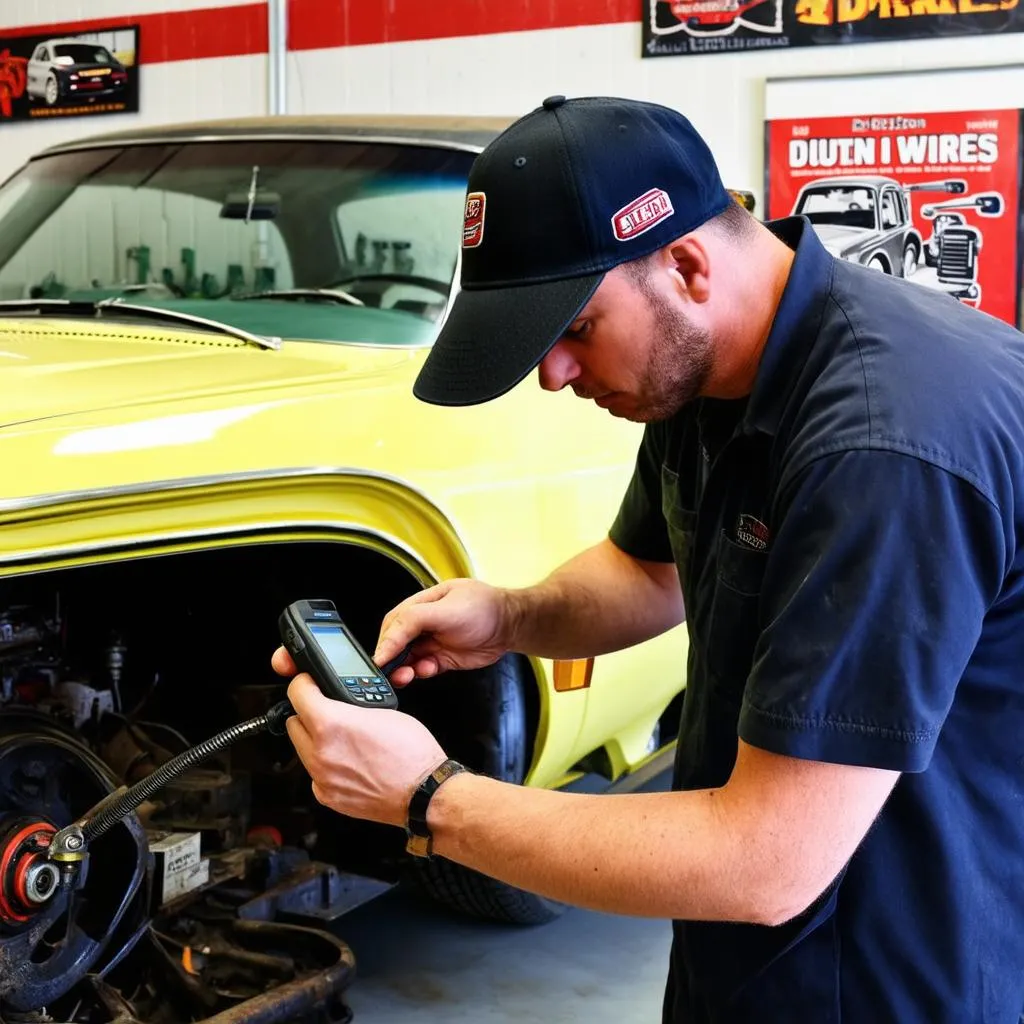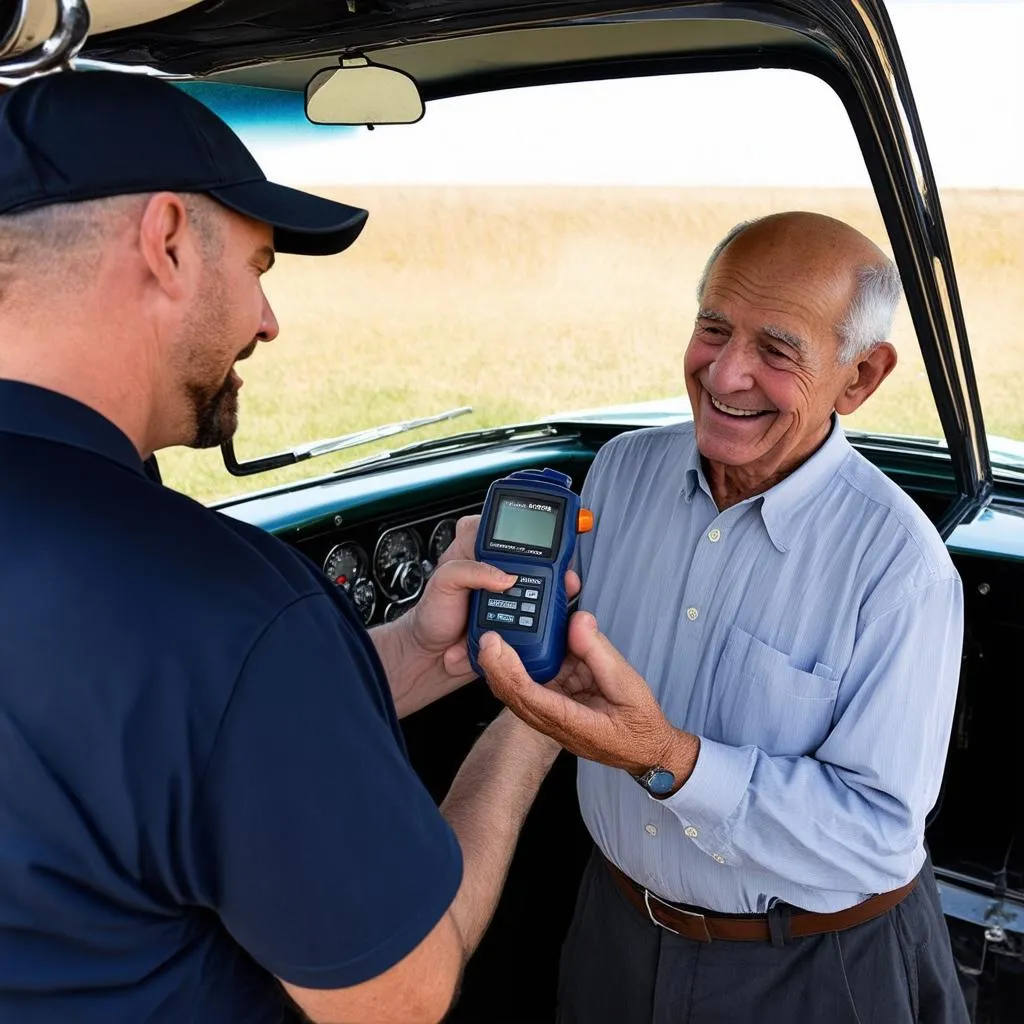“Back in my day, cars didn’t have all these fancy computers!” Ever heard that from a seasoned mechanic, maybe while reminiscing about a ’67 Mustang? It’s true, older cars relied on simpler systems, but that doesn’t mean diagnosing them was a walk in the park. Enter the Obd 1 Scanner, a tool that bridges the gap between those classic engines and modern diagnostic needs.
But finding the right OBD 1 scanner can feel like navigating a maze. What does OBD 1 even mean? Are these scanners compatible with my car? And what kind of information can they actually unlock?
Buckle up, because in this article, we’re taking a deep dive into the world of OBD 1 scanners, exploring everything from their history and functionality to their limitations and how they can empower you to keep your vintage ride running smoothly.
Decoding the Mystery: What is an Obd 1 Scanner?
OBD stands for On-Board Diagnostics. Think of it as your car’s internal communication system. Now, OBD 1, introduced in the late 1980s and used until the mid-1990s, was the first attempt at standardizing how cars “talk” about their engine’s health.
Imagine you’re working on a puzzle, and each puzzle piece represents a different sensor in your engine. An OBD 1 scanner is like having a guidebook that tells you:
- What each puzzle piece (sensor) does: It identifies the sensors monitoring things like engine speed, coolant temperature, and oxygen levels.
- If a piece is out of place (malfunctioning): It retrieves diagnostic trouble codes (DTCs) that pinpoint potential issues.
OBD 1 scanners were a significant leap forward, allowing mechanics to move beyond guesswork and pinpoint problems more efficiently.
A Blast from the Past: OBD 1 vs. OBD 2 – What’s the Difference?
You might be wondering, “What about OBD 2? I hear that term thrown around a lot.” You’re right to be curious! OBD 2, introduced in 1996, revolutionized car diagnostics with its standardized connector and more comprehensive diagnostic capabilities.
Think of OBD 1 as the first generation of cell phones – functional but limited. OBD 2 is like the smartphone era – sleeker, faster, and capable of much more.
However, for those passionate about preserving automotive history, OBD 1 scanners remain an invaluable tool for keeping classic cars running their best.
 Mechanic Using OBD1 Scanner on a Classic Car
Mechanic Using OBD1 Scanner on a Classic Car
The Language of Your Engine: Understanding OBD 1 Codes
OBD 1 scanners communicate through a specific language – diagnostic trouble codes, or DTCs. These codes are like your car’s way of saying, “Hey, something doesn’t feel right!”
Unlike the more standardized OBD 2 codes, OBD 1 codes varied significantly between car manufacturers and even between car models. This meant mechanics often needed multiple scanners or adapters to diagnose different vehicles.
For example:
- General Motors (GM) vehicles used a 12-pin ALDL connector and displayed codes as flashing “Check Engine” lights.
- Ford vehicles from this era also used a unique connector and displayed codes through a series of flashes on a self-test output.
This lack of standardization could make diagnosing problems a bit like solving a cryptic crossword puzzle. But fear not! There are resources available, like online databases and service manuals, to help you decipher these codes.
Navigating the Roadblocks: Limitations of Obd 1 Scanners
While revolutionary for their time, OBD 1 scanners do have limitations compared to their modern counterparts:
- Limited Diagnostic Scope: OBD 1 scanners primarily focus on engine performance. They may not provide insights into other systems like ABS, airbags, or transmission.
- Manufacturer-Specific Codes: As mentioned earlier, the lack of standardized codes can make diagnosis challenging, often requiring additional resources for interpretation.
- Compatibility Issues: Finding an OBD 1 scanner compatible with your specific car model might require some research.
Beyond the Codes: Obd 1 Scanners and Your Classic Car
Despite their limitations, OBD 1 scanners offer valuable benefits for vintage car owners:
- Preserving Automotive History: These scanners provide a way to maintain and troubleshoot classic cars, keeping automotive history alive.
- Cost-Effective Diagnostics: OBD 1 scanners can help you identify problems early on, potentially saving you costly repairs down the road.
- DIY Empowerment: With some research and a reliable scanner, you can take control of your classic car’s maintenance, deepening your connection with your vehicle.
 Car Owner and Mechanic Discussing OBD1 Scanner Results
Car Owner and Mechanic Discussing OBD1 Scanner Results
Unlocking Your Car’s Secrets: FAQs About Obd 1 Scanners
Q: Will an OBD 1 scanner work on my 1996 (or newer) car?
A: Most likely not. Cars manufactured from 1996 onward are equipped with OBD 2 systems, which use a different connector and communication protocol.
Q: Can I use an OBD 1 scanner on a European car from the early 1990s?
A: European car manufacturers had their own pre-OBD and early OBD systems, which might differ from the US-centric OBD 1 standard. Check your car’s service manual or consult with a specialized mechanic for compatibility.
Q: I’m getting a “Check Engine” light but my OBD 1 scanner isn’t showing any codes. What could be wrong?
A: There could be several reasons for this. The issue might be unrelated to the engine management system, the scanner might not be compatible with your car model, or there could be a problem with the scanner itself. It’s always a good idea to double-check your connections and consult your car’s service manual.
Keep Your Classic Rolling: Find Your Perfect Obd 1 Scanner
Ready to unlock the secrets of your classic car’s engine? At techcarusa.com, we offer a range of diagnostic tools to help you keep your vintage ride running its best. Check out our selection of [OBD 1 scanners and adapters](link to relevant page on your website, if available) to find the perfect fit for your vehicle.
Still have questions or need help choosing the right tool? Don’t hesitate to [contact us](link to contact page) – our team of automotive experts is here to help!
And remember, a well-maintained classic car is more than just a mode of transportation – it’s a piece of history!
Need help with installing diagnostic software or have a tricky automotive issue? Contact our 24/7 support line on WhatsApp at +84767531508. We’re here to help you keep those engines humming!